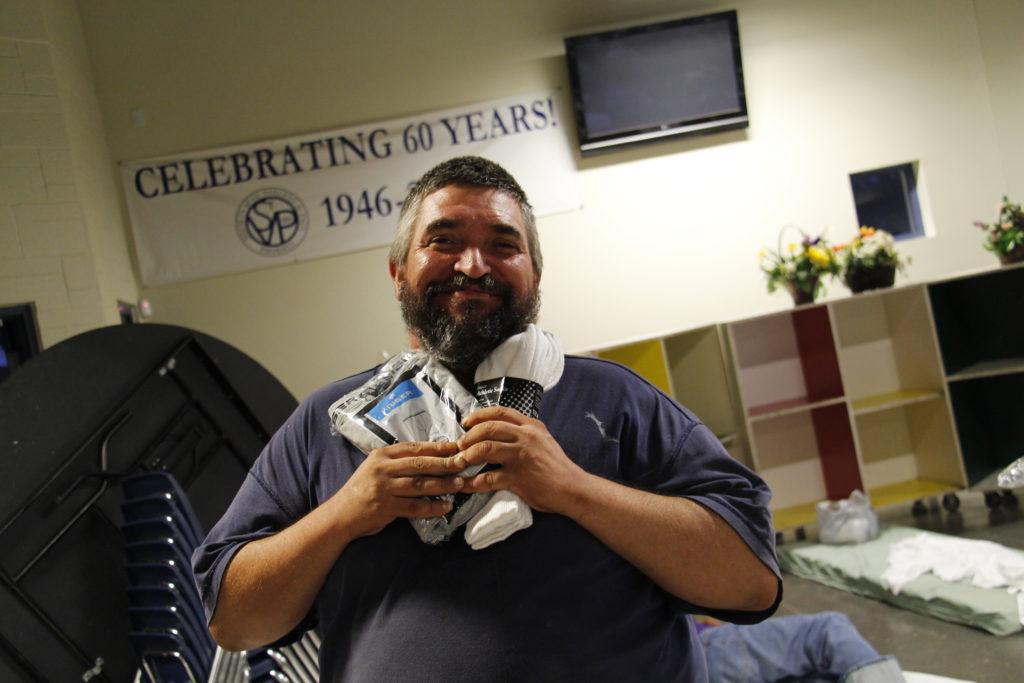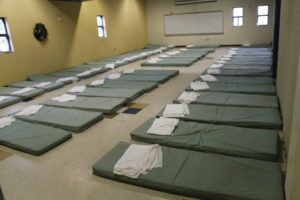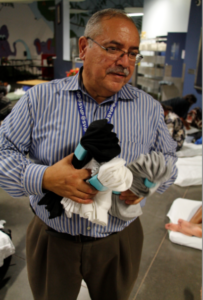

A St. Vincent de Paul dining room that nearly functions like a restaurant now offers sleeping quarters too.
The makeshift sleeping area puts 25 men with disabilities on simple mats in a semi-private area of the dining room floor. On nights of extreme temperatures or looming rain, another 100 men pile in to the main dining area.
It’s the same spot where 600 continental breakfasts and 600 lunches provide life-sustaining nourishment daily for those facing temporary or chronic homelessness. They eat dinner there Fridays when nearby André House is closed.
Another 75-90 women quickly drop what few belongings they carry with them — typically fitting into a backpack — onto similar olive green mats. Their backpacks or shoes double as pillows.
Many gladly sit or lie down and savor their first true taste of personal space that day. The space isn’t much though. They have room to recline and a few inches of freedom on each side of them.

The women’s mats line the dining room lobby and a large meeting room. All told, some 200 people without homes find some place indoors to rest each night. It’s been that way since April 1 when the closure of the Men’s Overflow Shelter that served guests since 2006 was not a joke of the day, but a permanent reality. The building wasn’t up to code and was always intended as a short-term solution.
Central Arizona Shelter Services, which sits near a host of other agencies on the Human Services Campus, lost funding for the overflow lot. The shelter itself remains maxed out at 400.
Partner agencies like St. Vincent de Paul and the Lodestar Day Resource Center, both just west of the state Capitol, joined efforts alongside volunteers to protect their homeless guests from the harsh outdoors. They also offer light security and can quickly address problems when a guest’s temper rises.
“God is good and blessed us to be able to do the things that we’re able to do,” Jerry Castro said, shortly before guests arrived for their overnight stay on a questionably stormy night in July.
The dining room manager prayed that the staffing and support continue so they can still provide for those with so little. Castro credited staff at the Lodestar Day Resource Center who coordinates overnight staffing with some volunteer support from St. Vincent de Paul. The LDRC also has overnight guests in its lobby or, in better weather, out front to supervise.

“It’s amazing coming together so quickly to be able to help so many people,” he said.
The Human Services Campus averaged 300-350 guests per night in the spring. It’s now hitting 400 and tipping that scale. St. Vincent de Paul only bought 400 sleeping mats.
Castro estimated serving some 1,200 unduplicated guests so far. He’s hopeful that hundreds of rapid re-housing vouchers eases the strain a little.
Castro said his team of staff and volunteers pitch in to break down tables and chairs or set them up again. Sometimes they’re able to offer little luxuries like a few pairs of new socks that came in by the caseload from area donors. Vincentian conferences and corporate sponsors have provided water throughout the summer.
“It’s good to see an entire community stepping up to make a difference,” Castro said.
Cash donations help as well. Two of the three air conditioning units have been replaced since St. Vincent de Paul’s dining room began doubling as a makeshift shelter. The facility is now occupied 18 hours a day so age and heat took its toll on the systems.
It will continue to do so for the foreseeable future. St. Vincent de Paul agreed to open its facilities for overnight guests into November. That gives involved agencies including human services at the county and city level and the state housing trust time to create a long-term solution. Castro said the dining room would likely double as a shelter as long as needed.
Ermest, one of the overnight guests, sees the new sleeping arrangements as “a whole lot safer.” He’s been coming to the Human Services Campus off and on since it opened 10 years ago.
He occasionally gets behind a microphone during the weekly “Never Give Up” empowerment program that runs during breakfast. The inspiration came to Ernest after spending time in the chapel wondering why he keeps finding himself homeless. Then he realized being there with his peers gave him a chance to “preach to other knuckleheads.” He offers them a gift through song, generally a soulful version of “Amazing Grace.”
“It gets their day started in a good mood. It gets everybody equaled on one page,” Ernest said.
He loves to watch faces in the crowd as he sings. Smiles often merge.
“You can’t buy that. You can’t get that anywhere,” Ernest said. “That’s priceless.”





